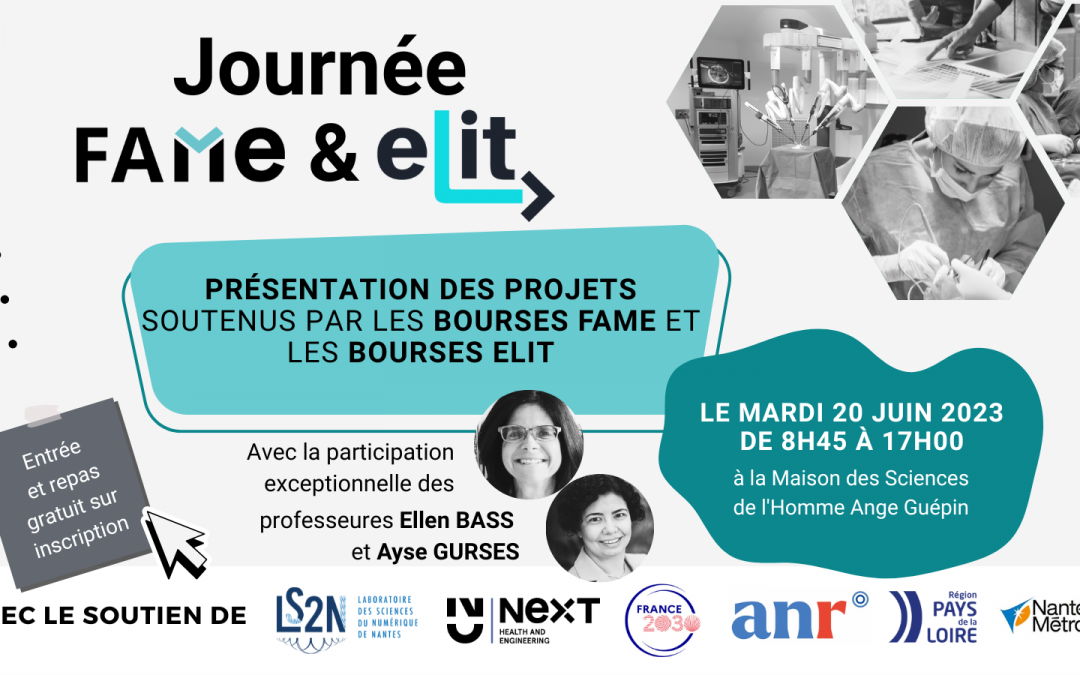Les clusters FAME et ELIT ont le plaisir d’accueillir Ellen Bass et Ayse Gurses, deux chercheuses de renom en facteurs humain pour la santé, pour deux conférences sur les enjeux de la transition de soins pour les patients et les personnels médicaux.
Ces deux conférences seront suivies d’une table ronde sur le sujet : « Transition of Care : application of human factors in the transition of care for healthcare workers and patients ».
La matinée sera dédiée aux présentations des projets lauréats financés par les clusters ELIT et FAME cette année.
Rendez-vous le mardi 20 juin à la Maison des Sciences de l’Homme Ange Guépin à Nantes, ou en visioconférence.
Inscrivez-vous sur EventBrite (le repas est offert) : https://www.eventbrite.fr/e/billets-journee-fame-elit-651298339867
Présentation des projets FAME (matinée)
De 8h45 à 12h, les étudiant.e.s stagiaires et leurs encadrant.e.s présenteront leur projet ainsi que les résultats obtenus au cours des derniers mois.
9h30 – Projet 1 : Modélisation de la glycémie chez les cyclistes professionnels pendant l’exercice avec des données de fréquence cardiaque, de puissance et de CGM
Coralie BANDET, Emeric SCHARBARG (CHU Nantes / Institut du Thorax et Système Nerveux / LS2N), Claude MOOG (CNRS / LS2N)
9h50 – Projet 2 : Électromyographie pour le contrôle de prothèses
Camille THOMAS, Xiangwei MENG, Yann PEREON (CHU de Nantes / Institut du Thorax et Système Nerveux), Yannick AOUSTIN (Université de Nantes / LS2N) et Eric LECARPENTIER (Centrale Nantes / LS2N)
10h10 – Projet 3 : Prise en compte des images radiologiques et pilcam dans la formation des externes en gastroentérologie avec la plateforme KIMI
Ramla DHMINE, Cédric DUMAS (IMT Atlantique / LS2N), Harold MOUCHERE (Université de Nantes / LS2N), Arnaud BOURREILLE (CHU de Nantes / Institut des Maladies de l’Appareil Digestif)
10h30 – Pause
11h00 – Projet 4 : Formation des internes en robotique chirurgicale : analyse de l’activité de travail
Marine TESSIER, Jérôme RIGAUD (CHU Nantes / Ecole de chirurgie et de pratiques interventionelles), Christine VIDAL-GOMEL (Université de Nantes / CREN)
11h20 – Projet 5 : Plastron interactif pour la simulation de situations sanitaires exceptionnelles
Charlotte MARTY, Vincent KUCZER, Emmanuel BERNIGAUD, Céline LONGO (CHU Nantes / Urgences, Médecines et Prévention)
11h40 – Temps collectif d’échanges et clôture
Conférences sur les transitions à l’hôpital (après-midi)
De 14h à 17h, Ellen Bass et Ayse Gurses interviendront sous forme de deux conférences suivies d’une table ronde sur le sujet : « Transition of Care : application of human factors in the transition of care for healthcare workers and patients ».
Conférence 1 : Reengineering Health Care Work Systems to Support Distributed Cognitive Work: Examples from Care Transitions
Ayse P. Gurses, PhD, MS, MPH
Director, Center for Health Care Human Factors, Armstrong Institute, Johns Hopkins Medicine
Professor, Schools of Medicine, Bloomberg Public Health, Whiting Engineering, Johns Hopkins University
Résumé : Health care work, especially during care transitions, is done in a distributed fashion (ex., across different physical locations and time), by fluid teams with variable and rotating membership. As in other high-consequence, high-risk settings, safety of care transitions relies heavily on effective distributed cognition and collective sensemakingacross people (i.e. clinicians, specialists, family caregivers), time (e.g., different shifts), locations (e.g., hospital, home); this highly-cognitive and distributed work is frequently mediated by a variety of tools/technologies (e.g., electronic health record systems, after-visit summary), each with its own design characteristics. In this presentation, we will describe how human factors engineering and human-centered design approaches are essential (1) to the in-depth understanding of underlying hazards and resilience strategies in care transitions; and (2) to the development of effective and innovative work system redesign efforts to support care transitions. Key concepts and insights will be illustrated based on different types of care transitions: cardiac operating room to intensive care units, emergency department to pediatric intensive care unit, and hospital to home.
Conférence 2 : Transitions in care from hospital to home care: Supporting admission nurse decision making through improved health information technology
Ellen Bass, PhD, MS
Interim Senior Associate Dean for Research, College of Computing & Informatics
Professor, Health Systems and Sciences Research, College of Nursing & Health Professions
Professor, Information Science, College of Computing & Informatics
Affiliate Professor, School of Biomedical Engineering, Science, and Health Systems
Drexel University
Résumé : Demand is growing for homecare due to an aging population with multiple chronic diseases and to patients preferring homecare over facility-based care. Homecare patients tend to be vulnerable older adults and some experience a readmission to the hospital within 60 days. Thus the hospital to homecare admission process is critical to quality healthcare and to reducing readmissions. Timely, accurate, and comprehensive information about the patient facilitates transitions from the hospital to home and prevents readmissions. No standards have been developed to support the admission process specifically and many homecare agencies lack the ability to receive structured data from referral sources. Thus information relevant to the plan of care is often lacking at the start of homecare. Missing, incomplete or incorrect information can impact the quality of the care plan which in turn may impact quality of care and patient outcomes. Based on focus groups and in-home observations of nurses from three diverse homecare agencies with three different electronic health record systems, we characterized the nature of the admission nurses’ work with respect to important decisions in order to identify their information and decision-making needs and how clinical work may be mediated by technology. This talk will present our findings regarding information requirements, decision-making, and workflow and provide insights on whether the electronic health record systems are helping. The talk will also present recommendations for standards that address homecare admitting nurses’ information requirements, decision-making, and workflow. The talk will also address opportunities for enhanced policy and information technology to support homecare.

